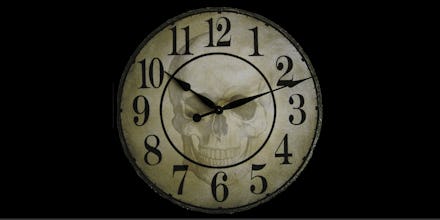When Am I Going to Die? There's an App For That

If you want to know exactly how many hours, days, and minutes you have left on this beautiful green earth, there's an app for that.
In fact, there's more than one. Days of Life, which was reviewed by Mark O'Connell on the New Yorker's Page-Turner blog this week, calculates your lifespan based on your age, gender, and nationality. Another app, Death Clock, makes a prediction based on a 15-question survey about your dietary habits and lifestyle. Both are available through the iTunes store and cost just 99 cents each.
I am male, 24 years old, and live in the United States. So, according to Days of Life, I will live to be 76. That leaves me, at the writing of this sentence, with 18,778 days left until I die. The results screen also features a pie chart, the green-shaded region of which represents the portion of your life you have left to live, while the orange-shaded region is the portion of your life you've lived already. Roughly one-third of my pie chart is shaded orange. There will be no quarter-life crisis for me next year, apparently. According to Days of Life, that ship sailed when I was 19.
Unlike Days of Life, the Death Clock app also factors in your health. It offered me a slightly brighter outlook — I'll live to be 79! — but not without informing me, in curt app-speak, "Your body mass index (BMI) is 25. You are overweight."
We should take these predictions with a grain of salt. As O'Connell points out his New Yorker piece, the criteria these apps use to predict a user's death are blatantly crude. He writes, "If I happened to reside in either of the two options above or below Ireland on the scrolling list of countries in the settings — Iraq or Israel — I'd be looking at [65] and [80] years, respectively."
Similarly, Death Clock's questions about health and lifestyle leave little room for subtlety. Do I, for instance, smoke (A) zero cigarettes per day, or (B) five to 10? How do I account for the one or two I bum from my co-worker most weekdays? Another question asks if I sleep (A) four to seven hours each night or (B) seven to 10. It's an odd distinction, given that most people seem to get from six to eight. The answers to choose from in the question about diet include "I eat what I want when I want" and "I don't eat." With such an important figure on the line — the most important figure of all, in fact — you'd think the app creators would know better than to kid around.
But she feared time itself, and read on Lady Bruton's face, as if it had been a dial cut in impassive stone, the dwindling of life; how year by year her share was sliced.
Of course, neither Days of Life nor Death Clock is pretending to be a scientifically accurate predictor of death (though I do imagine their algorithms draw on real, statistical data). Instead, the purpose of the apps, as O'Connell writes, "is to make you consider your own mortality and to want, as a result, to spend your remaining time as wisely as possible."
There's value in talking and thinking about death. Beauty, even. Some of my favorite lines in literature are precisely about that unknowable abyss awaiting us all. Days of Life's pie chart brings to mind this moment from Virginia Woolf's Mrs. Dalloway, for example: "But she feared time itself, and read on Lady Bruton's face, as if it had been a dial cut in impassive stone, the dwindling of life; how year by year her share was sliced."
Death is sad. Death is serious. Death, at its best, reminds us of the sweetness of life, of the crucial importance of living. This is why we keep it at bay but not out of sight, why we never talk about it in conversation, but seek it out in art. By constantly reminding us our lives will end, death, in its weird way, makes us feel more alive.
But death is also funny, and, at times, even hilarious. And this is why I — who have mostly scathing things to say about the cheapness and banality of digital culture — love the cheapness and banality of these death-predicting apps. Days of Life and Death Clock cutesify death, which is probably the only ineradicable fact of life that can stand to be cutesified. I like the kitschy cartoon grim reaper on Death Clock's home screen. I like that Days of Life sends me an occasional alert telling me how many days I have left to live, in much the same way that Words With Friends tells me when it's my move. I like that, in a century unhealthily and unproductively preoccupied with health and productivity, we have apps daring enough to mock our obsession with living life to the fullest.
I have a problem with the idea that sheer longevity is the best measure of the quality of life, or that the best way to use one's time is to cram as many milestones and accomplishments into it as possible. The sweetness of life does not reside in a stopwatch or a nine-dollar kale-and-cucumber smoothie.
The beauty of Days of Life and Death Clock is that, by tapping into our obsession with time and health in the most extreme way possible, they hold a mirror up to our ridiculousness. "Scared of death? You should be," they seem to say. "Here, this is how many days you have left. Now, spend them wisely. Run, live longer. Smoke, die sooner. It doesn't matter. This number's fake anyway. But no one can tell you more accurately than we can when you'll be snatched from this earth, or how, or why."